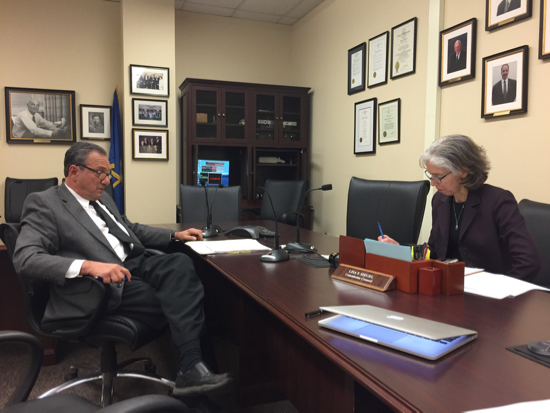photo:ethan fry Ramon Sous, a lawyer representing the City of Shelton, and Lisa Siegel, a Freedom of Information Commission hearing officer, at a contested case hearing in Hartford April 13, 2017.
That’s the question at the heart of a complaint The Valley Indy filed against the City of Shelton in front of the state’s Freedom of Information Commission.
The complaint was filed Jan. 20 because the city’s Planning and Zoning Commission presumably violated state law by not filing meeting minutes within seven days, as required by the Freedom of Information Act.
The law says minutes of meetings must be filed within seven days. The commission didn’t file the minutes on time for six meetings last year — at a time when the commission was considering the controversial “Shelter Ridge” development application.
In the case of the commission’s Sept. 21 meeting, minutes weren’t field until 121 days after the meeting.
The chronic tardiness was due to a lack of staffing at Shelton City Hall combined with a lack of knowledge on open government laws, officials said.
Click here for a previous story by the Valley Indy and Shelton Herald.
Click the play button below to listen to the state open government hearing, which was presided over by Lisa Siegel. Shelton Assistant Corporation Counsel Ramon Sous represented the city, and reporter Ethan Fry represented the Valley Indy.
Siegel will consider the testimony offered at the hearing and write a report for the consideration of the full Freedom of Information Commission, which will ultimately rule on the case.
Other Cases
The Freedom of Information Commission last week voted to deny two appeals filed by the Valley Indy in local cases.
In the first, the Valley Indy filed a complaint with the commission against the Ansonia Board of Education after they talked behind closed doors about a donation form the city sent out with tax bills.
The Valley Indy argued the discussion wasn’t covered by one of the exceptions spelled out in the Freedom of Information Act that governs when public agencies can exclude the public.
But the commission ruled that the discussion was OK, even if the agenda for the school board’s meeting was illegally vague, because the school board was receiving a written opinion from their attorney about the donation form.
Click here to read the hearing officer’s report in that case.
In the second case, the Valley Indy complained that the City of Ansonia held a meeting of officials last year to discuss blight issues without filing an agenda within enough time to give the public notice before the meeting took place.
But the commission ruled that the public didn’t need any notice because it really wasn’t a public meeting of a public agency, even though city officials had said that it was and had filed an agenda in the town clerk’s office advertising the get-together.
Click here to read the hearing officer’s report in that case.